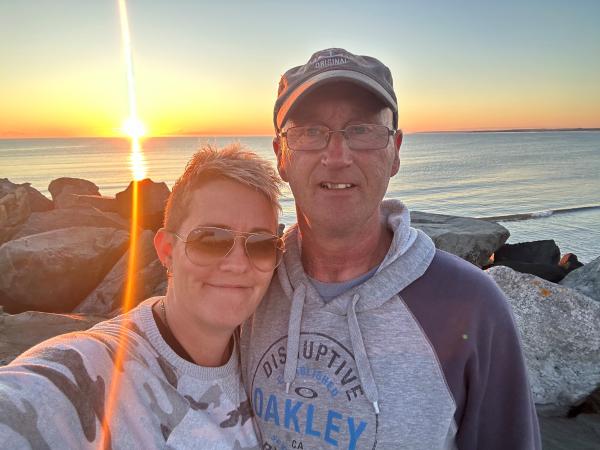“Great work, healing touch and kind smiles will always be remembered” after traumatic injury

“Somebody was looking out for me; I’ll tell you that,” said Mark Weagle of his care following a traumatic injury at home in Yarmouth on June 26, 2023. Weagle badly injured his hand in a split-second incident involving a piece of machinery that processes firewood.
“I’m told the ambulance was here within 18 or 19 minutes,” said Weagle, who remembers telling the paramedic, “Just get me in that ambulance and get me to the hospital.”
Weagle, who said he was on the verge of the end of his life, was transported to Yarmouth Regional Hospital (YRH). Staff and physicians at YRH stabilized Weagle before sending him to the QEII Health Sciences Centre in Halifax.
Tanya Maillet, Weagle’s partner, recalled the experience of being at YRH. “Thank goodness for all of the staff and physicians working in the emergency department that day.”
Maillet said the team at Yarmouth explained that Weagle would be sent to Halifax for surgery and might need to have his arm amputated. While Maillet was on route to Halifax, she received a call from Weagle – the nurses had given him a phone to call Maillet to let her know he’d arrived safely. When Maillet arrived at the hospital between 2 and 3 a.m., staff explained that Weagle would have surgery in the morning with Dr. Emily Krauss. Maillet waited with him.
The team explained that surgery would take eight to 10 hours. It was a long day for Maillet. However, halfway through the day, a nurse called her to tell her things were going well. “It was such a meaningful phone call,” said Maillet. “It made my day.”
Surgery went well, and Weagle did not require an amputation. He commented on how well his pain was managed throughout his experience. “I had zero pain the whole way through it.”
Weagle spent four days on the burn unit at the QEII Halifax Infirmary, where Maillet said the nurses were pleasant and kind and “provided a lot of emotional support” during the first dressing change when Maillet first saw the wound.
The white boards at the foot of Weagle’s bed, where nurses wrote their names, was also helpful, said Maillet. “There were so many people; it was hard to remember who was who, so it was nice to know there was a reference.”
Maillet said the Pain Clinic and Spiritual Care were also helpful and kind.
Weagle was discharged from hospital the Thursday before the Canada Day long weekend in 2023. Maillet was nervous. However, she and Weagle were reassured by having his pain block left in for the weekend, with an explanation of how to take it out, and VON set up to come the next day. A doctor would also call every 24 hours to check in.
“It was so reassuring,” said Maillet. “We weren’t alone at home. It was a good transition. Mark was happy to be home in his own bed.”
Weagle is diabetic and had been on insulin in hospital. He changed back to pills when he returned home, but his sugar became high. The couple called the Diabetes Clinic, who worked with Primary Care to arrange for him to start back on insulin, preventing him a return trip to hospital.
“Whatever we needed, we could get. It was wonderful,” said Maillet.
After Weagle had been home for about a week, he realized his eyesight was distorted. When the couple came to the QEII for their follow-up appointment with Dr. Krauss and a physio appointment at the Nova Scotia Rehabilitation Centre, Dr. Krauss sent him to the Eye Care Clinic at the QEII right away.
Not being familiar with how to find the clinic, Maillet was reassured to see a red vest volunteer at the entrance, who said, “I’ll bring you right to where you need to go.”
Unfortunately, due to the degree of blood loss from his injury, Weagle’s optic nerve died, and he ultimately lost the vision in one eye.
As for his hand, Weagle still has numbness, but is experiencing some sensation again. He will see Dr. Krauss again in October. He said he is still able to do everything he did before, just a little more slowly. He said he “can’t say enough” about the many people who helped him along the way.
Maillet, who works for Nova Scotia Health as a Quality Improvement and Safety Advisor, said going through this experience and being so well supported has given her a new perspective.
“When I went to go back to work, it made me realize inside that same building, people are having the worst day of their life. As health care workers, we can be the bright light for them.”
Maillet said even though staff, physicians and volunteers “couldn’t change the situation, they were making the situation the best they could for us. That’s what we remember – the kindness people showed.”
In a letter to the health system, Maillet wrote: “THANK YOU to every health care worker for showing up at work that day and every day and providing the best care possible. You have made a difference in our lives, your great work, healing touch and kind smiles will always be remembered.”
Photo of Mark Weagle and Tanya Maillet.